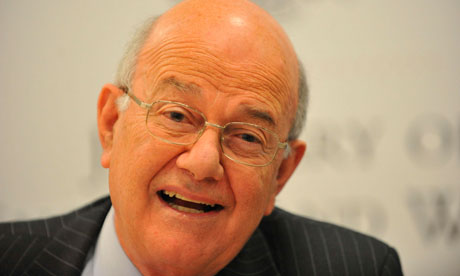PM's desire for a sitting judge means casting beyond supreme court for candidate to head probe into police investigation

David Cameron wants the phone-hacking inquiry to be headed by a judge and has asked the lord chief justice, Lord Judge, above, to find the right candidate. Photograph: Ian Nicholson/PA
Who will be appointed to head the inquiry into how the police investigated the phone-hacking scandal?
This makes sense. The supreme court is understaffed. Judges from the UK's highest court – such as Lord Saville and Lord Hutton – have not proved notable successes at running inquiries.
I would expect the appointment to be at the level of the court of appeal rather than the high court. But those courts are also too busy to spare a judge for what might be a year or more.
He is also the judge in charge of the administrative court, which means he is well used to reviewing decisions taken by public bodies such as the police. But his background is in planning and construction law.
While still at the bar, May headed a commission of inquiry into the Isle of Man-based Savings and Investment Bank, which had collapsed in 1982. A former chairman of Guildford Choral Society, May has risen to the highest levels of the judiciary without acquiring any sort of public profile, which means that nobody is likely to take against him.
But there is one factor above all that makes him the lord chief justice's likely choice: May retires in three weeks' time. Appointing him would not leave the bench with an empty seat.
He may not want the job, of course. The Inquiries Act allows ministers to interfere at every level with inquiries that used to be independent of government. Lord Saville, who chaired the Bloody Sunday inquiry, told the government in 2005 that he would not accept an appointment to an inquiry whose conduct was subject to the sort of ministerial restrictions that the act introduces.
The judiciary are well aware that every time one of their number agrees to chair a high-profile public inquiry, it becomes harder to persuade the public that judges are faceless, impartial seekers of truth. But there's a quiet satisfaction that when people can no longer trust the press, police or politicians, only a judge will do.
The prime minister promised on Friday that witnesses would be questioned by a "judge under oath", which suggests that the inquiry will be set up under the Inquiries Act 2005.
That legislation requires a senior member of the judiciary to be consulted before a serving judge is appointed. We learned at the weekend that Lord Judge, the lord chief justice, had been consulted. From this we may infer that the judge will come from the court of appeal, or a lower court, rather than from the UK supreme court.
I would expect the appointment to be at the level of the court of appeal rather than the high court. But those courts are also too busy to spare a judge for what might be a year or more.
So Lord Judge's first instinct would be to offer the prime minister a retired judge. David Cameron is unlikely to accept the two former judges suggested by Geoffrey Robertson QC on Friday, Lord Hoffmann and Sir Stephen Sedley. As Robertson acknowledges, the ex-law lord and the former appeal judge have already expressed their views on the issues to be investigated. Far better to go for somebody who has kept his powder dry.
That might just count against Sir Mark Potter, president of the high court family division until last year, who spoke as recently as last Friday at a conference in Oxford on "justice, the media and popular will". But Potter, who has had plenty of dealings with the media over the years and whose son was once a BBC journalist, would still be an excellent person to lead the inquiry.
If Cameron is keen on having someone who is still sitting as a judge, then the lord chief justice is likely to recommend Sir Anthony May, 70. As president of the high court Queen's bench division, May is the third most senior judge in England and Wales.He is also the judge in charge of the administrative court, which means he is well used to reviewing decisions taken by public bodies such as the police. But his background is in planning and construction law.
While still at the bar, May headed a commission of inquiry into the Isle of Man-based Savings and Investment Bank, which had collapsed in 1982. A former chairman of Guildford Choral Society, May has risen to the highest levels of the judiciary without acquiring any sort of public profile, which means that nobody is likely to take against him.
But there is one factor above all that makes him the lord chief justice's likely choice: May retires in three weeks' time. Appointing him would not leave the bench with an empty seat.
He may not want the job, of course. The Inquiries Act allows ministers to interfere at every level with inquiries that used to be independent of government. Lord Saville, who chaired the Bloody Sunday inquiry, told the government in 2005 that he would not accept an appointment to an inquiry whose conduct was subject to the sort of ministerial restrictions that the act introduces.
But Jason Beer QC, whose 500-page book on public inquiries will be launched by OUP this week, writes that "only a very small number of provisions of the 2005 act can really be described as being controversial in any way". He points out that the government's powers to suspend or terminate an inquiry are subject to judicial review.
http://www.guardian.co.uk/law/2011/jul/11/phone-hacking-inquiry-police-judge

